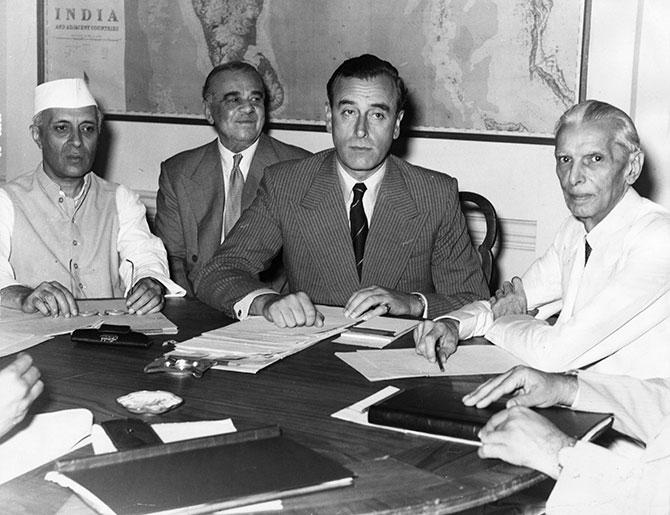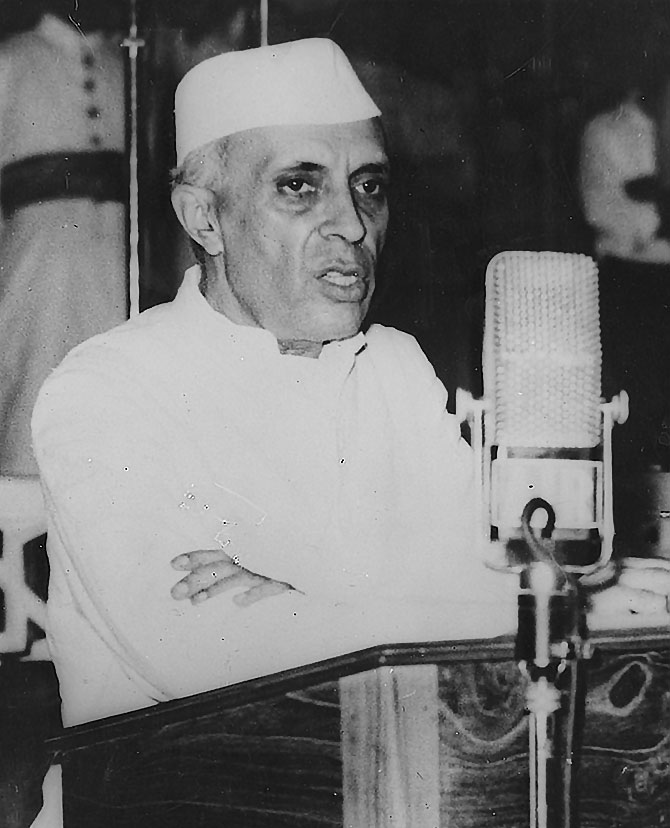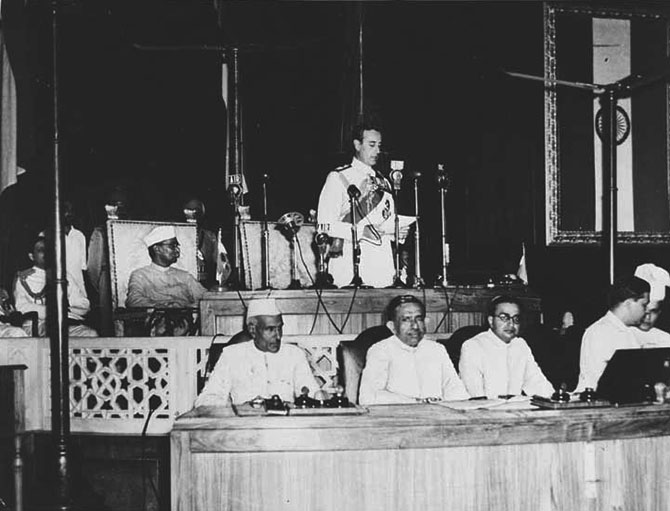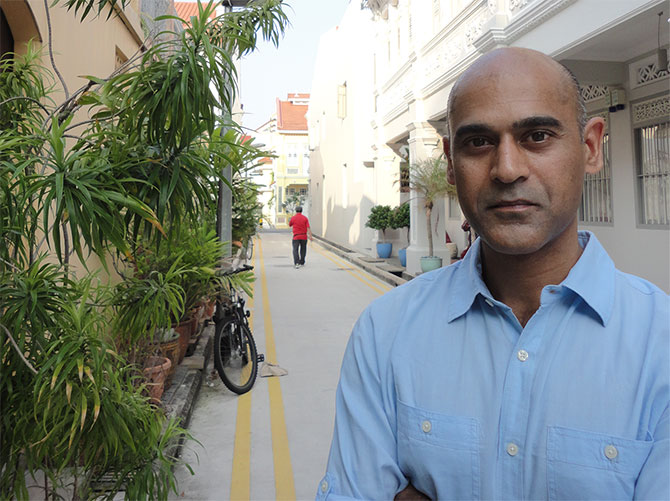'Nehru had multiple chances to make compromises, that would have preserved a united India, and he chose not to...'
'There was a particular mutual dislike between Nehru and Jinnah. Probably their personalities were so different... They were very similar in some ways. They were complete opposites in many other ways,' Nisid Hajari, who wrote Midnight's Furies: The Deadly Legacy of India's Partition, tells Vaihayasi Pande Daniel/Rediff.com
IMAGE: The conference in New Delhi where Lord Louis Mountbatten disclosed Britain's plan for the Partition of India. Left to Right: Jawaharlal Nehru, Lord Ismay, adviser to Mountbatten, Lord Mountbatten, and Mohammad Ali Jinnah. Photograph: Keystone/Getty Images.
Nisid Hajari spent a decade overseeing Newsweek's coverage of post 9/11 Afghanistan.
In the course of supervising that reportage, as the foreign editor -- and since he had subcontinental roots -- he was often asked to interpret Pakistan's role in the crisis.
"I kept getting a lot of interest from people. And questions. 'Why does Pakistan do this? Why? And I kept saying there is this story (of Partition) you don't know," recalls Nisid, who is currently based in Singapore, whose Gujarati Hindu parents grew up in Mumbai.
Those perplexing riddles seeded the idea of doing a book on Partition. "It grew out of the work I was doing."
Hajari felt there was a direct connect between a string of incidents in Pakistan's often murky present and its blood-soaked, tumultuous birth in the monsoon of 1947. That cause and effect was something the world now might be rather interested in since it was no longer just a regional tale for Indian and Pakistani school textbooks.
It was the 70-year-old chapter of history, he believed, that was responsible for the build up of an explosive situation that has the potential to rewrite world events, quite comparable to Gavrilo Princip shooting Archduke Franz Ferdinand and his duchess in Sarajevo on June 28, 1914, or the never ending, bitter Palestine-Israel conflict, or Kim Jong-un building a rogue empire.
When Newsweek changed ownership in 2013, Hajari was looking for a change. He decided to take two years off from nine-to-five journalism (if there is such a thing) to write a book on Partition.
He spent the next 18 months hopping between the cavernous archives, on three continents, digging up as many key documents, accounts and records of the turning points that led to Partition.
Those crucial footnotes of history -- letters, diaries, telegrams and memoirs -- were gleaned to construct, and flesh out, new profiles of the main players of Partition, and bring them back to life.
Over, finally what turned out to be three years, he constructed, what he felt was, a fresh perspective on Partition, taking time to re-evaluate historical roles, snipping and weeding out redundant biases. In the bargain, offering coverage befitting of what he considers to be a landmark happening in the history of the 20th century.
Midnight's Furies: The Deadly Legacy of India's Partition was published by Houghton Mifflin Harcourt in June.
History ought to be examined, and re-examined, threadbare, before nations have the capacity to move on, is Hajari's contention. Only then maybe Partition and its overstaying ghosts can be laid to rest, eventually maybe, optimistically, leading to better relations between India and Pakistan.
"The only persons this current situation serves is the Pakistani army and Indian television channels," says Hajari, who now works with Bloomberg in Singapore. In his previous stint atNewsweek, he spent 10 years in New York. He has also lived in Seattle, Hong Kong, New Delhi and London.
Hajari has been surprised by the praise Midnight's Furies received from Indian intellectuals, who picked up his book, not thinking they would be reading anything new and told him they ended up learning a lot.
He received some criticism too -- on Twitter of a different kind from people who had clearly never read his book and believed him to be Muslim -- for what they felt was his going easy on the British over their role in Partition.
Nisid Hajari was in India for a rapid two-city book tour in July and spoke to Vaihayasi Pande Daniel/Rediff.com about Midnight's Furies and Partition.
In your book, you came up with a lot to incriminate Jinnah. And plenty to blame Nehru for too. You seemed to have found Jinnah a troubling, polarising, egotistic character, known for his vindictiveness and his negligence of the human cost. That leads to the most important question those of us in India have: Who would you apportion the blame, chiefly, for the perilous path the subcontinent took in 1947?
It would be hard to assign a number or figure, percentage wise. I thought Nehru and the Congress leaders were equally to blame. Actually, I feel, and I hope it comes across, that I had a bit more sympathy for Jinnah then most Indian accounts of Partition generally have.
IMAGE: On the occasion of becoming prime minister of the new Union of India, Nehru asked members of the Constituent Assembly to take a pledge of loyalty to the new nation. Photograph: Keystone/Getty Images
But through your book, Nehru sounds much more charming, giving us insight into the Peter Pan side of the statesman that Jinnah often spoke bitterly about saying, 'Peter Pan who never learns or unlearns anything.'
Personality-wise, Nehru was more charming than Jinnah; even Jinnah's friends would admit that.
But in terms of who is responsible for the mistakes -- and ruining the chance of political compromise -- I think, in that case Nehru was at least as much to blame as Jinnah.
Jinnah was arguing the case like the lawyer he was. Nehru had multiple chances to make compromises, that would have preserved a united India, and he chose not to.
He may have been more charming personally. Personally, he might have been the person you wanted to have dinner with! He was a flighty, impractical, emotional politician, who was operating at some level of high principle, that was not very pragmatic.
I think Jinnah had very good reasons not to trust Nehru and the Congress and that is Nehru's fault.
IMAGE: Refugees from West Punjab at the Wavell Canteen in Delhi taking their meals before leaving for various refugee camps, September 1947. Photograph: Photo Division, Government of India
Nevertheless, do you think that Jinnah was aware that his politics was akin to riding a tiger, which he would eventually not be able to get off?
I am not sure any of them were. They were all doing it. Gandhi and Nehru, as well.
There was as much vicious anti-Muslim behaviour going on, as the opposite. And these people were followers of the Congress. Gandhi didn't realise it. There was (for instance) that scene of Noakhali (the riots in October-November 1946, in Chittagong district in un-partitioned Bengal in which 5,000 Hindus were killed) in the book.
Gandhi did not understand that some of the things he was saying there were inciting Hindus to go kill Muslims.
In Bihar?
Exactly, in Bihar (riots broke out in Chhapra and Saran districts in late October 1946, as a reprisal for the Noakhali riots, killing anywhere upwards of 5,000 Muslims; the death toll figures varied widely).
At the very, very top level, all these people -- Nehru, Jinnah and Gandhi -- were so distant from their followers. They were in Delhi. They were just in drawing rooms, with each other, negotiating and they were so used to the kind of rhetoric you would use in a courtroom.
The things they would say, the things they would write in the press. I don't think they quite realised the impact those words would have at the ground level. In that case, I would hold all of them guilty.
So they were all guilty of riding that tiger?
They all didn't understand that the negotiations they were doing -- the kind of brinksmanship, the hard line positions they were taking, all part of negotiations -- were happening against the backdrop of these increasing tensions all around the country.
They were too focused on what was happening in their little room and didn't understand this was having an impact elsewhere.
You describe that Nehru admitted, when discussing the Partition of Punjab, for instance, that they had not gone into any great detail about how it would actually happen.
So Nehru's wrong doing was not just alienating his rival Jinnah but also not understanding the nitty-gritty of how Partition would unfold? They were all, perhaps, guilty of being vague about the details?
Impractical.
About the ground realities?
Yes, yes. About the mechanics. None of them were administrators. None of them had ever held executive positions. They were all trained as lawyers and had become politicians.
So if you asked Nehru: 'Okay you want to split the Punjab -- how are you going to divide the education part of that?' he would have had no idea. (Or about) the police force, the administration. All stuff that the British had handled till that point... They again didn't understand the reality of the impact of the things they were doing.
So in your view, would you equally apportion the blame? You wouldn't say perhaps Jinnah was more to blame? And also do you think if the Congress knew about Jinnah's poor health, the formation of Pakistan could have been avoided?
This has come up all the time. His illness (Jinnah was suffering from tuberculosis since the 1930s). He wasn't hiding anything. He had been a sick man for many years. And in 1946-1947 he wasn't any more sick than any other time. He didn't get really sick until 1948.
But he had tuberculosis?
He had had it for years. In 1947 he had to take a whole month off, and recuperate in some village outside Karachi. The year before, he had done something similar.
But wouldn't it have made a difference if people knew?
Impossible to say. Let's say he had died in 1947. Who is to say that whoever came after him, in the Muslim League, wouldn't have been more radical? How do you know, somehow, that this would have been better for India?
IMAGE: Mountbatten addresses the Independence Day session of the Constituent Assembly, August 15, 1947.
Let me give another analogy. Supposing you are having a child and you know you are not going to be around, some time after the child is born. You are frail. You would definitely think a little more about how things would happen in your absence? Pakistan, in a sense, was Jinnah's child.
I have come across nothing to suggest that he thought he was about to die.
I think he thought he was going to live for a long time and continue to lead Pakistan.
Even in the pictures taken on Pakistan's Independence Day he looked very frail.
Oh yes, he was a sickly man. But a lot of sickly people think that they are healthy.
As described in your account, in the days after Independence, as Nehru and Patel grappled with controlling the rioting, one might feel that Patel understood the reality better. He seemed to have his finger on the pulse, even if he was a hardliner.
Yet at the same time, one had to admire Nehru's dashing spirit in trying to go out there and discipline mobs single-handedly, in a sort of romantic Lochinvar style. Or was it more for show? Has your research shown he was really that kind of man?
That was his genuine personality. I don';t think he was showing off for anyone.
That captures both what's admirable and frustrating about him. It is admirable, that in a cinematic sense, he would risk his life.
It was also exactly the wrong thing for a leader to do. A leader, in order to effectively control the riots, should delegate and order the army to go there.
This is what frustrated Jinnah no end. He is sitting in Karachi, while these riots are happening. He's getting biased reports, but he is (still) getting reports of what is happening.
Jinnah is sitting and thinking: Why cannot Nehru and Patel -- they have this powerful army, police, a government in place -- why can't they control this? It is because instead of trying to control it Nehru was running around...
Looking for his father's pistol to fight the rioters with?
Exactly.
But those sort of vignettes you don't have about Jinnah?
Right, right. He was a different kind of man.
What did you like best about Jinnah?
The way people have treated Jinnah in modern Indian accounts is just to demonise him. The inherent assumption is that demanding Pakistan was the wrong thing to do.
I tried to come at the subject with an open mind. Maybe partitioning was the wrong thing to do, maybe it was right, but Jinnah at least had legitimate support for his demands. He'd just had to prove that democratically, through provincial elections. And it was a demand, that up until the very last minute, he was willing to negotiate.
Until the spring of 1946 he was still willing to accept a united India, under the right political conditions.
If you just look at that, then there is no reason to demonise him. He was a leader, leading his people. He happened to do it in a way that a lot of people found abrasive, and Nehru in particular loathed.
You are a lawyer arguing a case. You should be able to do it in whatever way that is appropriate.
Jinnah was on the political scene, first, before Gandhi. Nehru came along later and both sort of stole Jinnah's position. Was Nehru's primacy in the Congress under Gandhi responsible for making Jinnah more bitter that his ambitions had been thwarted?
He (Nehru) had a great deal to do with it. Jinnah was also frustrated by Gandhi, Patel and all the Congress leaders.
But there was a particular mutual dislike between Nehru and Jinnah. Probably their personalities were so different. I don't think they could really understand each other and what (each was) trying to do. They were very similar in some ways. They were complete opposites in many other ways.
Of the three leaders you portray -- Gandhi, Nehru and Jinnah -- Pakistan's future Quaid e Azam is the most fascinating, in that what could have made an alcohol-drinking, (reportedly) pork-eating man take the right turn that he did?
Well, he definitely kept drinking. I don't know if he kept eating pork or not.
In his personal life I don't think he changed that much. He became more of an Islamic, Muslim figure. He did this on purpose to broaden out his appeal.
A fascinating man?
Definitely fascinating. Extremely frustrating to research. Unlike Gandhi and Nehru -- who wrote everything down and it has all been collected; there are letters and diaries, a ton of material to work with -- with Jinnah that just wasn't what he did.
He just didn't write. His letters are all very formal, business like. He kept no diaries. He kept people away from him. There was nobody close to him who could write a memoir and say this is what Jinnah was like when no one else was around.
Even his sister (Fatima Jinnah), her book (My Brother) about him is written... everything written about him is such a hagiography, that no real picture of the man comes out. I did the best I could, but it was very hard as a researcher...
So you are saying there was a lot more to the man, but not enough material one can lay one's hands on to construct a kinder or more fascinating view?
Yes. He is clearly a complex figure. Getting at the heart of that complexity is difficult.
In one of the reviews of your book I read that it remained unclear how much Jinnah really wanted Partition. Or whether he pursued the idea more as a tactic to increase Muslim clout within a larger India? Also in your view, what could have been done to avoid Partition?
This is the famous debate -- whether Jinnah was demanding Pakistan merely as a bargaining chip, or not. The honest truth is that no one knows.
My best guess is that it started out as a bargaining chip, and at some point, probably very late in the process, probably as late as 1946, it became something more.
During the course of the war, the demand for Pakistan became more widely popular than maybe even Jinnah might have imagined it would. After the war, he was both pushing the demand and was also being carried along by it.
IMAGE: After working for Newsweek in New York for a decade, Nisid Hajari now works with Bloomberg in Singapore. Midnight's Furies is his first book.
Up until the spring of 1946, a political compromise that would have preserved a united India, was still possible. The Congress -- Nehru in particular -- would have had to grant the Muslim areas that (eventually) became Pakistan more autonomy than he was willing to grant, and have had to accept a weaker Central government than he wanted.
Abandoning that compromise was the fatal mistake.
You (Nehru) couldn't just dismiss this demand as illegitimate and say you weren't going to deal with it. You had to accommodate it somehow. And as the larger, more powerful party it was their responsibility to accommodate it. You don't ask the weaker party to make the concessions. You have to be generous.
Nehru for his own reasons chose not to.
I think that was the last real chance to avoid Partition. Maybe it could have still happened later, no one knows, but at that point it was really possible to preserve a united India.












No comments:
Post a Comment